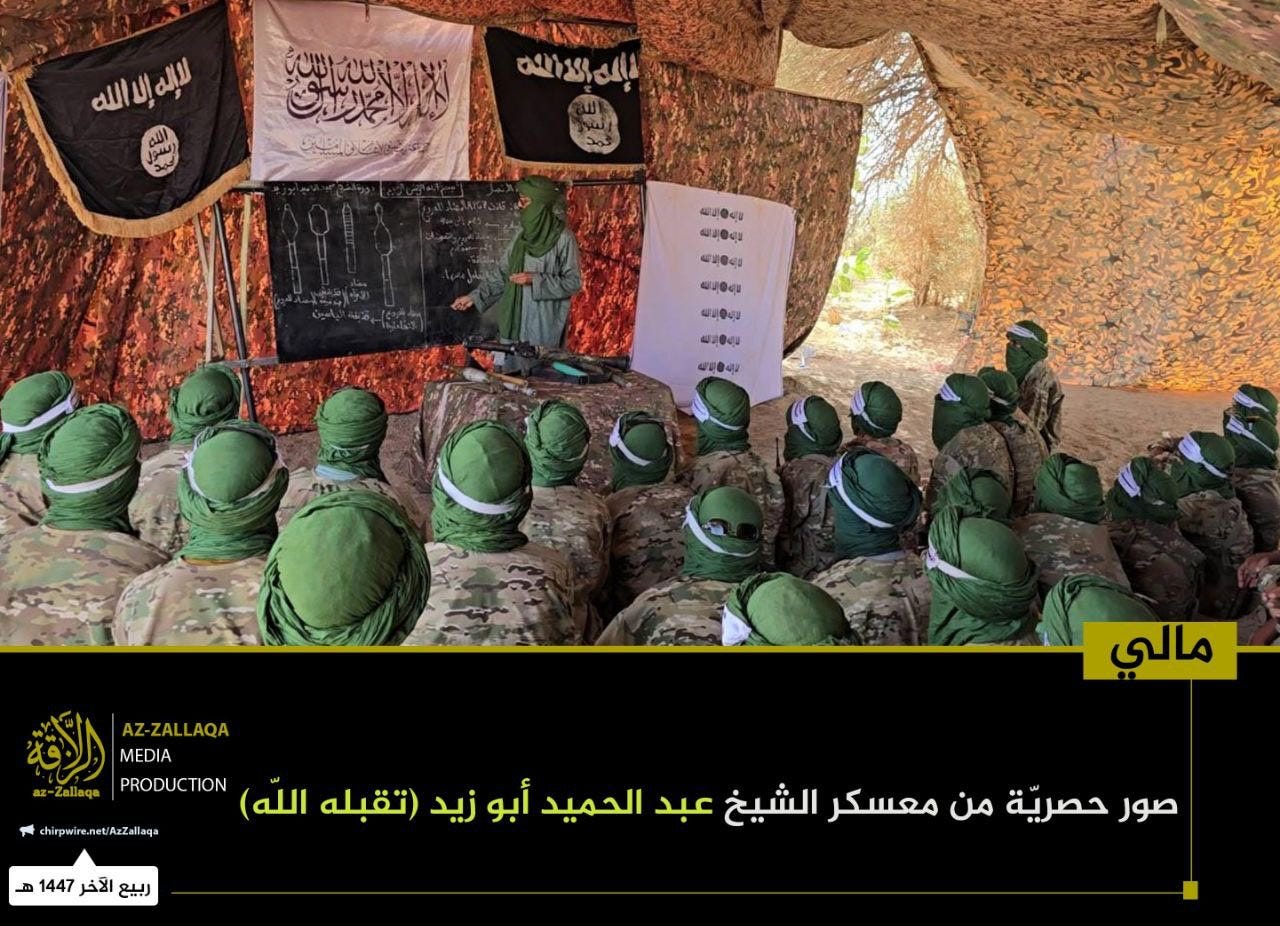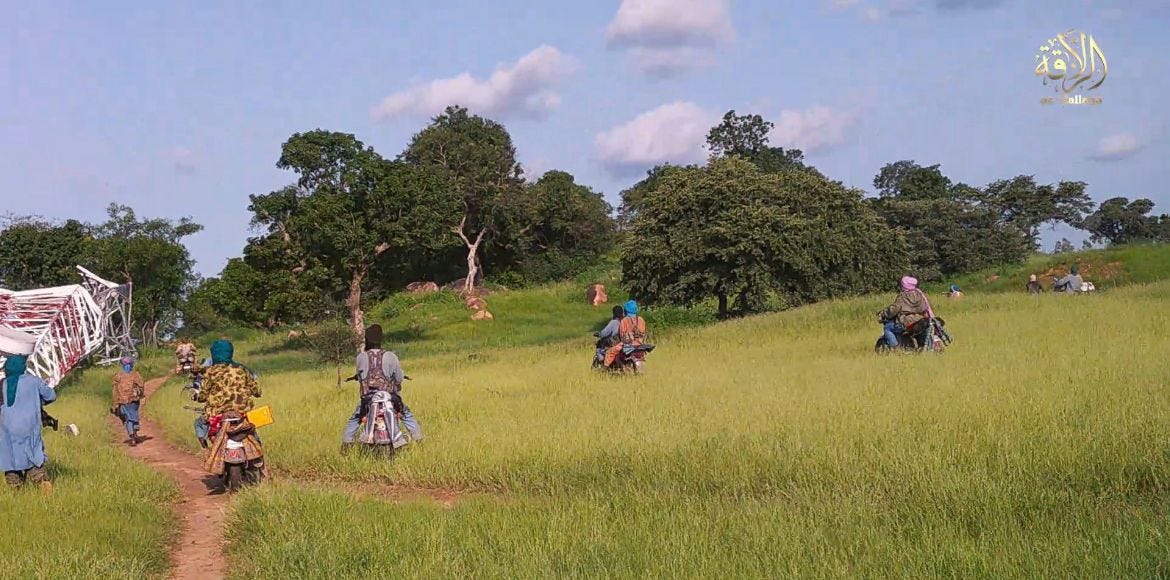Security Risk Monitoring and Threat Assessment: JNIM in Africa
Military Operations October 2025
Daniele Garofalo Monitoring is registered with the Italian National ISSN Centre and the Centre for the Registration of Serial Publications (CIEPS) in Paris.ISSN (International Standard Serial Number): 3103-3520ORCID Code: 0009-0006-5289-2874In recent years, Saharan and Sahelian areas have become increasingly important in threat assessment and risk expansion, particularly concerning Salafist-jihadist terrorism.
Objectives of the analysis: to assess the latest operational developments of Jama’at Nasr al-Islam wal Muslimin (JNIM) in its areas of operation in Africa.
Date: October 2025
Methodology: monitoring of jihadist propaganda (videos, photos, statements, claims) and reports from sources in the field.
Sources: open sources, primary sources available on JNIM channels and websites, official reports, and local sources in the field.
Verification: cross-checking, date cross-checking, and use of local and international sources.
Limitations: incomplete information (sometimes reports and claims by groups exaggerate numbers or do not claim activities that have actually been carried out), bias in sources, possibility of propaganda and disinformation.
Structure of the analysis: brief overview of the group, updates on recent military activity, analysis of the number of attacks, graphs and statistics, photos, areas, conclusions and assessments.
Organisations/groups:
Jama’at Nasr al-Islam wal Muslimin (JNIM).
Allied/Affiliated: Al-Qaeda.
Activity area:
Mali, Burkina Faso, Niger, Benin, Togo (activities have also been recorded in the past year in the Ivory Coast, Nigeria and Mauritania or on their borders).
Overview and Security Threat Assessments:
The many problems of popular discontent, economic and social vulnerabilities, etc., have been the basis of support for independence movements in the North in the past. They are also the basis for the recruitment of jihadist organisations today. The strongest of these is undoubtedly Jama’at Nasr al-Islam wal Muslimin (Group for the Support of Islam and Muslims - JNIM), a coalition of Salafist-jihadist rebel groups operating in the Sahel region of sub-Saharan Africa, particularly in Mali, Niger and Burkina Faso, but with attacks also conducted in recent years in Togo, Ivory Coast, Benin and Senegal. JNIM was founded in March 2017 by the merger of four Salafist-jihadist groups in the Sahel: Ansar Dine led by Iyad Ag Ghali, Ahmed Kouffa’s Katibat Macina, al-Mourabitoun and the Saharan branch of al-Qaeda in the Islamic Maghreb (AQIM). The JNIM has become very adept at conveying the discontent and demands of the poorer sections of the population and ethnic minorities, particularly the Tuareg and Fulani. Since its inception, the JNIM has extended its operational territory throughout West Africa, conducting a sustained campaign of violence against civilians, local security forces, international armies and UN peacekeepers. The Qaedist affiliate in the area has managed to progressively insert itself into the complex Malian context, presenting itself as a credible and legitimate alternative to both the government in Bamako and the rebel movements. The JNIM managed to operationalise local demands, while the responses to the insurgency failed to address the political causes of the conflict and encouraged human rights violations.
The expansion of the JNIM in northern Mali and the Sahelian area is linked to social, political and economic factors rather than ideological factors. Jihadist groups have managed to create an alternative and more efficient welfare system than that of the central government, through the distribution of necessities and care services, employment, education (always linked to radicalism), the administration of justice, and the defence of communities and minorities. The latter has allowed the JNIM to assimilate, manoeuvre and revive the old nationalist claims of minorities, offering them political and logistical support and, in most cases, taking control of the territory and the fight against the government in Bamako. The leadership of the Qaedist group was assumed by Iyad Ag Ghaly, one of the most influential Malian Tuareg leaders, former leader of Anṣār al-Dīn and former lieutenant of Osama bin Laden for Africa. Many minorities facilitate JNIM operations in Mali, and some spread outside Mali, giving the group access to a wide collaboration network.
Over the years, JNIM has significantly increased its operations and attacks throughout the country, not only in the north but often pushing into neighbouring countries. The organisation uses a federalist and para-state organisational model, imposing direct control of the territory to better manage, directly or indirectly, the trafficking of migrants, drugs and weapons, which it exploits to feed its structure and finance its activities.
The JNIM was created precisely to better coordinate the activities of the numerous jihadist groups in the area, optimising recruitment and proselytising in the Sahelian area. JNIM attacks are mainly directed against military infrastructure, convoys of local armies and civilian targets in major Malian and Burkinabé cities, and against MINUSMA and Wagner. The latter has increased the consensus and recruitment of the JNIM in the area due to its excessive violence. Violence against civilians increased after the arrival of the Russian mercenary group. Wagner’s attacks have targeted Fulani civilian communities mainly because of his alleged links to the armed jihadist group Jama’at Nusrat al-Islam wal-Muslimin (JNIM), composed of the Massena and Sirma factions. The different patterns of violence in the north and centre of Mali and Burkina Faso reflect the multiple structures of terrorist alliances in those regions. The north is controlled by the command and operations of JNIM leader Ghali, whose strategy has focused on attacking foreign forces and making deals with key figures such as militia and political and religious leaders. However, Amadou Koufa operates in central Mali and Burkina Faso as a field commander and imam and as the creator of a different kind of strategy that draws support from the ethnic minorities, who triggered the conflict.




